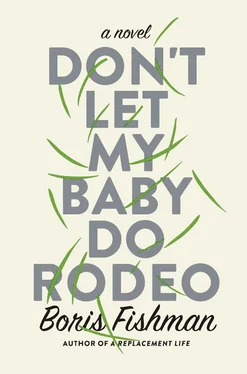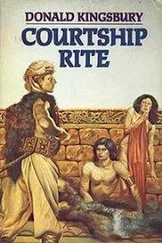“Raisa!” Maya broke in. “Is he all right?”
“In one piece, thank God,” Raisa said. When she was relaying the news of Max’s return, she was triumphant, but now a note of hesitation appeared in her voice.
“What is it? Maya said.
“Who does this, darling?” Raisa said. “Eugene said, ‘The grandson we found, now we lost the mother.’”
“Raisa—”
“We were mindless with worry.”
“You could have called the bus line,” Maya said sharply. “Asked them to dispatch it to the bus that I took. It only takes a little imagination. But you would rather sit there mindless with worry.”
Raisa, who had been starting to speak, fell silent. “I am not going to pay attention to what you just said because you are upset,” she said. “And God knows where you’ve been.”
“I’ve been looking for my son,” Maya said. “Now tell me where he was.”
“He was in a river!” Raisa said, as if Maya’s willfulness were responsible. “They brought him here like Moses in the basket. Families that have nothing to do with ours keep bringing our boy to us.”
“Watch your voice,” Maya said.
“He’s upstairs in the shower. Alex rushed him into a hot shower.” A hot shower — the Rubin remedy for the humiliations of fate.
“What do you mean he was in a river?” Maya said.
“In a river,” her mother-in-law repeated. “Facedown in a river. All right?”
“I don’t understand,” Maya said. “But he’s fine. He’s fine, isn’t he? You said he was fine.”
“They got him in time,” Raisa said. “I can’t make sense of it, honestly.”
“That doesn’t make any sense,” Maya started to say, but Raisa cut her off, her own voice quavering — she did not make a custom of interrupting her daughter-in-law. “Just come home.”
Maya saw Frank watching her. Meekly, he pointed at his watch. Maya hung up on Raisa and returned the phone.
“He’s at home, just like you said,” Maya said feebly.
Frank pressed the horn three times in celebration. Someone yelled up from the back. “I’m going to have a mutiny if I don’t get going,” Frank said. “You have a ride home?”
She did. Her husband was busy scrubbing down her son in the shower, and her mother-in-law refused to drive in the night, let alone after her daughter-in-law had been so rude. The chore was left to Eugene, and she and her father-in-law suffered a silent quarter-hour as he ferried her back to the house.
+
After an hour-long shower, Max stood downstairs and watched nervously as the adults shouted at each other. Finally he was remembered and stared at nervously in return. Then he was rushed up to bed. No one pressed him with new questions — the Rubins feared they would get answered. As Raisa hustled Max into pajamas upstairs, he stared at the spot outside his window where his tent had stood only that morning.
“Baba,” he said nervously. “Can I sleep on the floor?”
“No, little boy,” she said as she fought with a sleeve of his pajamas. Under her hands, Max felt as bony as a fish. She regarded him a little fearfully. “Good boys sleep in bed.”
Max was left to stand by the wall while Raisa reapplied to the mattress the bedding that had been rolled up on the floor. She did not request Max’s help, as if he could not be considered an ally, and he did not offer it. Occasionally, his grandmother looked up from the sheets to make sure her grandson was standing where she had left him. He looked the same: Floppy-haired and semitranslucent. As she worked, Raisa murmured optimistically at the sheets — now, Maksik would climb into a nice and clean bed, and he would dream of camels, and flying carpets, and tents, too, if he wanted, until he awoke the next morning and all the events of the previous day would dissipate like a dream, and probably his mother or father would make his favorite breakfast of farina with bits of turkey sausage, and if they didn’t because they were upset with him (he could understand that, couldn’t he), his grandmother would.
When Max was wedged into the billows of his blanket — his grandmother had folded its edge under his feet so that he was “in an envelope,” just as she had done with Alex when he was a boy — Raisa sat down on the bed and studied her grandson. All Raisa’s ministrations were powerless against his strange metabolism; the more she fed him, the skinnier he became. Even at home, Max looked as fragile and unprotected as a pencil, and he had decided to go wandering in the world and lie down in a river.
“Maksik, I am going to ask you a question,” Raisa said. “And your only job is to answer me honestly. That’s the only thing you have to do, because your grandmother loves you, and lies hurt your grandmother. Do you want to hurt your grandmother?”
Max shook his head.
“Exactly. People who love each other don’t hurt each other. It’s in the contract.” She guffawed sadly at her joke. “Maksik, why did you run away? It’s okay for you to tell me. If you don’t want to tell your mama or papa, it’s okay — as long as you tell me.”
Max shrugged.
“When did you think of it? You planned it a long time ago?”
Max shrugged again.
“Max, you’re not allowed to say ‘I don’t know.’ Because if you don’t know, who knows?”
Max’s face was as expressionless as his blanket, which swam with stone-faced seagulls. Raisa could tell she was frightening him.
“I’ll let you rest,” she said. “But right after you promise to tell me tomorrow. Will you promise me that?”
Max nodded. His grandmother laid her wrinkled lips on the straight straw of his hair and let him be.
After Raisa had padded away on her bunioned feet, the landing in front of Max’s room was quiet, only the floor beneath him gently reverberating with the sound of the adults in the kitchen.
“You could have waited until he was back to roll up the tent,” Alex said.
“The boy is indulged,” Eugene threatened.
Alex’s resistance of his father was accompanied by glances at Maya that asked when she was going to pick up the rope of solidarity Alex was casting her despite her irresponsible disappearance. She chided herself for failing this gesture, for sloughing off onto her husband the chore of beating back his parents. She sat gloomily in the corner of the leather banquette by the kitchen table, Alex’s cognac two fingers deep in a filigreed drinking glass. Raisa, not feeling bold enough to contradict Maya out loud, eyed her daughter-in-law’s choice of seat — those who took the corner wouldn’t get married. And Maya eyed her mother-in-law, asking silently why this was worth Raisa’s attention when their child had spent the afternoon fifty miles away in a river. When Maya was already married.
Upon entering the house an hour before, Maya had clutched her son to her soiled blouse as if Max was being sent off somewhere, or perhaps she was. They were gently unsealed from each other by a team of Rubins—“Mayechka, he’s just had a shower, look at your shirt.” But now, showered and changed into sweatpants, the alcohol setting off a buzz at her temples, Maya felt an immobile sedation, not unlike the refrigerator that droned from the wall.
Alex rose and rummaged inside the pantry for an economy cylinder of canned peaches. The others watched him peel it open, envious he had a task. He ladled the contents into four bowls and set them out in front of the others. No one had had dinner. They watched him slurp away.
“These dry your tongue, like a persimmon,” Alex said to his father. “And the juice is viscous. We should go back. Those other we sold were like velvet.”
His father shrugged. “And the price was like velvet.”
“Can someone please tell me what happened,” Maya cut in. “Please.”
Читать дальше












